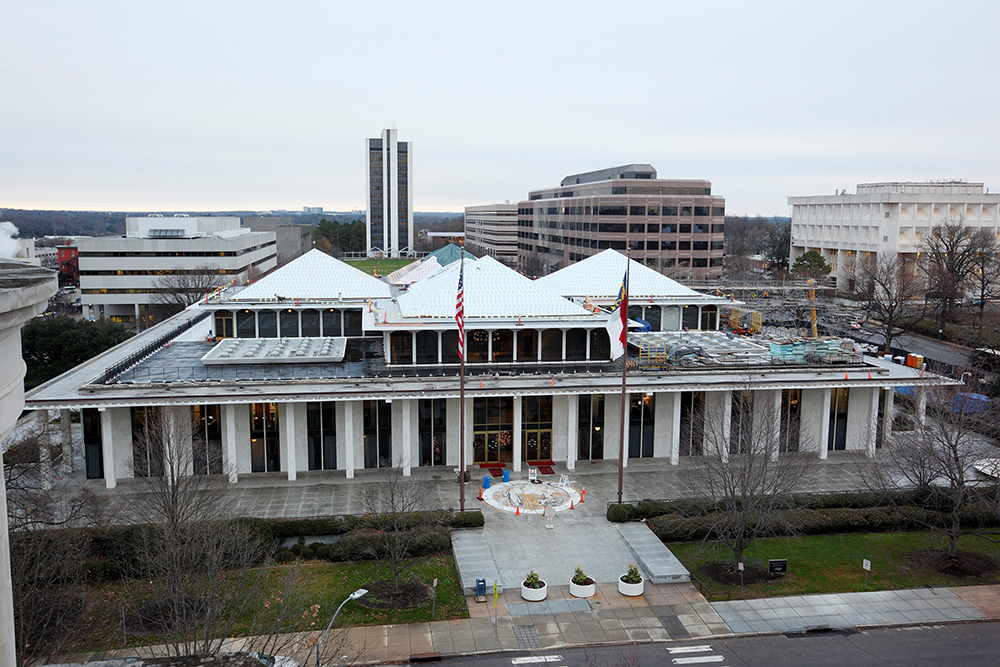
By Kate Scanlon
(OSV News) — North Carolina lawmakers Aug. 16 overrode the governor’s veto of legislation banning certain types of medical or surgical gender reassignment procedures in the state for minors who identify as transgender.
The Republican-led General Assembly overrode Democratic Gov. Roy Cooper’s vetoes of that legislation and similar bills on sports participation for those youth and on how LGBTQ+ issues are taught in schools.
Republican supermajorities in the state’s House and Senate enacted a bill barring medical professionals from providing hormonal or surgical gender-transition treatments to anyone under 18, with a few exceptions, including for those whom such treatments are already in progress with parental consent, despite opposition to that legislation.
In a statement, Cooper said the lawmakers passed legislation that “discriminates,” arguing they “still won’t pass a budget when teachers, school bus drivers and Medicaid Expansion for thousands of working people getting kicked off their health plans every week are desperately needed.”
“These are the wrong priorities, especially when they should be working nights and weekends if necessary to get a budget passed by the end of the month,” Cooper said.
Supporters of prohibitions on gender transition surgeries or hormones for minors who identify as transgender say such efforts will prevent them from making irreversible decisions as children that they may later come to regret as adults. Critics of such bans argue that preventing those interventions could cause other harm to minors such as mental health issues or physical self-harm.
Matt Sharp, senior counsel for Alliance Defending Freedom and director of its Center for Legislative Advocacy, said in a statement that “We commend the North Carolina Legislature for overriding the governor’s misguided vetoes.”
“In doing so, they are securing a level playing field for North Carolina’s female athletes, protecting children from life-altering, experimental ‘gender transition’ surgeries and drugs, and preserving parents’ right to direct the care, education, and upbringing of their children,” Sharp said. “When the law ignores biological differences, women and girls bear the brunt of the harm. As we continue to witness increasing incidents nationwide of males dominating girls’ athletic competitions, it’s imperative to affirm that biology, not identity, is what matters in athletics. North Carolina now joins the 22 other states that have acted to preserve fair competition for all female athletes, ensuring they will not face the losses that come with allowing males to compete in women’s sports.
Sharp argued that “Denying the truth that we are either male or female also hurts vulnerable children.”
“Young people deserve to live in a society that doesn’t subject them to life-altering, experimental ‘gender transition’ drugs and surgeries that have not been proven to be safe or effective and can result in permanent sterilization,” he said. “That’s why other countries — like Sweden, England, and Finland — are reversing course to curtail the use of dangerous ‘gender transition’ procedures and better protect children from the bad science that has already devastated countless lives.”
In overriding the governor’s veto, Sharp argued, “the Legislature also ensured North Carolina parents have greater access to the curriculum, policies, and information that affects their children.”
“Public schools have no right to shut parents out of their child’s education and development,” he said. “This legislation makes clear that the government cannot interfere with parents’ right to direct the care, education, and upbringing of their children.”
Liz Barber, director of policy and advocacy of the American Civil Liberties Union of North Carolina argued in a statement that “these bills will have devastating effects on trans youth who are already facing multiple barriers.”
“This is a coordinated attack on fundamental freedoms that affect us all: inclusion, bodily autonomy, and our right to privacy,” Barber said. “Transgender young people deserve to make choices about their own bodies, discuss their identities at school without fear of outing, and participate in sports teams that align with their gender identity. It is shameful that the General Assembly has continued to push this discriminatory agenda. We will continue to advocate for trans youth and protect the freedoms of all North Carolinians.”
North Carolina is the 22nd state to enact such legislation according to data from the Movement Advancement Project, which tracks LGBTQ+ policy. However, not all of those bans are in effect as some face ongoing legal challenges.
In guidance on health care policy and practices released March 20, the U.S. Conference of Catholic Bishops’ Committee on Doctrine opposed interventions that “involve the use of surgical or chemical techniques that aim to exchange the sex characteristics of a patient’s body for those of the opposite sex or for simulations thereof.”
“Any technological intervention that does not accord with the fundamental order of the human person as a unity of body and soul, including the sexual difference inscribed in the body, ultimately does not help but, rather, harms the human person,” the document states.
Several Catholic dioceses have begun forming pastoral approaches to gender dysphoria. The Diocese of Sioux Falls, South Dakota, issued guidelines in 2022 for transgender youth directing diocesan schools to demonstrate “conformity with the student’s biological sex as determined from conception and manifest at birth and at the time of the student’s enrollment.”
The Diocese of Des Moines, Iowa, issued guidance and policies in January on ministering to people experiencing gender dysphoria calling for coherence with the church’s teaching on the inseparability of gender from biological sex while emphasizing pastoral compassion for children or adults experiencing conflict between their biological sex and gender identity.
The Archdiocese of Portland, Oregon, issued a teaching document titled “A Catholic Response to Gender Identity Theory” from Archbishop Alexander K. Sample that same month, which also outlines the catechesis and pastoral guidelines for the archdiocese.
A 2022 study by the UCLA School of Law Williams Institute found that there are approximately 1.6 million people in the U.S. ages 13 and older who identify as transgender, with an estimated 300,000 of that population who are minors.
